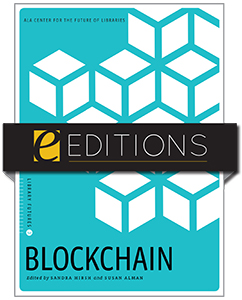
Blockchain—eEditions e-book
The download link for this product can be found on the final confirmation screen after you complete your purchase, and may also be accessed from your Account Profile. For more information about ALA eEditions file types and how to view them on eReaders, desktop computers, and other devices, see this page.
Primary tabs
You don't need to be an ALA Member to purchase from the ALA Store, but you'll be asked to create an online account/profile during checkout to proceed. This Web Account is for both Members and non-Members. Note that your ALA Member discount will be applied at the final step of the checkout process.
If you are Tax-Exempt, please verify that your account is currently set up as exempt before placing your order, as our new fulfillment center will need current documentation. Learn how to verify here.
- Description
- Table of Contents
- About the authors
- Reviews
Read an interview with the authors now!
Series Editor: Miguel A. Figueroa, Director, Center for the Future of Libraries
This book in the Library Futures Series examines blockchain technology, a concept with far-reaching implications for the future of the information professions. Blockchain uses a distributed database (multiple devices not connected to a common processor) that organizes data into records (blocks) that have cryptographic validation. The data are timestamped and linked to previous records so that they can only be changed by those who own the encryption keys to write to the files. In this book, editors Hirsh and Alman offer a primer of what librarians and information professionals need to understand about blockchain technology. Several speculative visions for how blockchain could support the core work of libraries are included to help librarians understand the possibilities for improved operations and services. Featuring essays from a range of information professionals who have interest and experience in blockchain technologies, this book presents valuable ideas for exploration relevant to everyone interested in the future of librarianship.
Acknowledgments
Foreword by Miguel A. Figueroa
Introduction: An Investigation of Blockchain Applications: Beginnings and Implications Sandra Hirsh and Susan Alman
Understanding Blockchain
- From Medieval Origins to Modern Applications, Christina Cornejo and Stacey Johnson
- Blockchain and Decentralization: Big-Picture Opportunities and Risks, Jason Griffey
- Blockchain: Merits, Issues, and Challenges, Bohyun Kim
Before the Hype
- Standards, Todd A. Carpenter
- Legal Considerations, Dan Blackaby
- Security, Tonia San Nicolas-Rocca
- Healthy Skepticism, Toby Greenwalt
For the Future: Speculative Applications
- Support for Scholarship and Scholarly Communications, MacKenzie Smith
- Credentialing and Continuing Education, Heather McMorrow and Amy Jiang
- Distributed Access to Library Metadata, Timothy A. Thompson
- Data Collection and Assessment, Annie Norman
- Lessons from Health Information Management, Victoria Lemieux
- Electronic Health Records, Frank Cervone
- Born-Digital and Digital-First Content, John Bracken and Michael Della Bitta
- Community-Based Collections, M. Ryan Hess
For the Present
- Blockchain Education for Communities, Link Swanson
Conclusion
Selected Resources
About the Editors
Sandra Hirsh
Dr. Sandra Hirsh is director and professor of the School of Information at San José State University. She is a past-president of ASIS&T and is the president-elect of ALISE. Her research interests include information seeking behavior, online education, and LIS education, and she was the co-PI of the IMLS-funded blockchain investigation. She cofounded and cochairs the global virtual Library 2.0 conference series.
Susan Alman
Dr. Susan Alman is a member of the San José State University School of Information faculty. Prior to this appointment, she taught at the University of Pittsburgh’s School of Information Sciences and the University of Michigan. She was the co-PI in the IMLS-funded project, Investigation of Possible Uses of Blockchain Technology. Her areas of interest are in online teaching and learning, foresight studies and emerging technologies, marketing/PR, and interpersonal communication.
"Noted San José State University (SJSU) School of Information faculty member Sandra Hirsh is joined by colleague Susan Alman to edit this interesting overview of blockchain concepts, possibilities, and challenges, all in the context of library applications and services ... [This book] is an excellent resource for library technical services professionals, information technology specialists, knowledge management leaders, and library information science students eager to learn more about new, emerging technologies that may benefit library users for years to come.”
— Technicalities
"Breaking this book up into roughly 1000- to 1500-word essays makes for a brisk introduction to a complex subject, and a subject that will increasingly command our attention. The authors make strong cases for the potential of blockchain while not shying away from the real hurdles to implementation.”
— Technical Services Quarterly
"Blockchain has the potential to be very useful to libraries or just a passing fancy. Reading this book will help to make it perfectly clear about what it is and if it can be used in libraries."
— Journal of Hospital Librarianship


